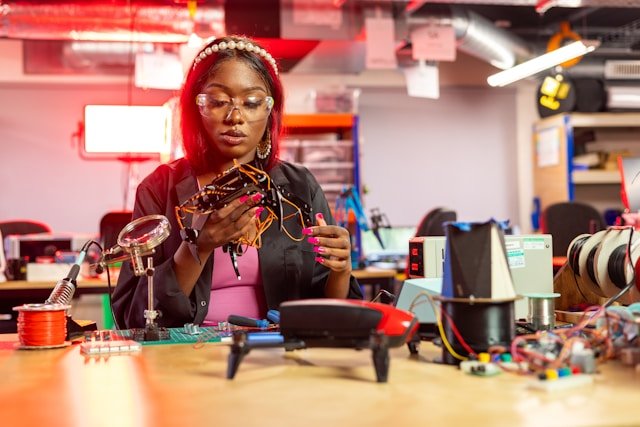Women’s empowerment and inclusion have been going on all over the world for quite some time now, the notion of “men-only” jobs slowly fading away as more and more women take up different responsibilities. Uganda, too, has seen this rise in women’s inclusion across many fields, for instance, the tech field. In fact, you will often find initiatives like The GROW, or such others, offering scholarships for women. Institutions, too, are stepping up, offering academic and vocational opportunities in STEM for young girls.
As for today’s article, it’s more about the “why.” Why does Uganda need more women in tech? Why is it essential that we not just encourage but actively support and integrate women into one of the most impactful industries of our time?
1. Bridging the Gender Digital Divide
Uganda’s tech sector is growing, but access isn’t equal, the gender divide is still there and it’s not small. Statistics show that only 19% of Ugandan women are online compared to 27% of men. That gap isn’t just about numbers — it’s about opportunity, voice, and access to tools that shape the future.
A few reasons drive this divide:
- Affordability: High data costs and the price of smart devices often discourage women from owning or using tech regularly.
- Cultural biases: Societal norms sometimes paint tech as a “male” domain, discouraging girls from exploring or taking an interest in digital tools early on.
- Digital illiteracy: Many women, especially in rural areas, aren’t given the same chances to learn digital skills.
Bridging this divide means giving women the same platform to innovate, learn, and grow. And that begins by actively investing in their digital education.
OPINION: Ugandan Women Still Left Behind in Technology, Innovation
2. Challenging Historical and Cultural Norms
For decades, the narrative around gender and technology has been a lopsided one. Historically, girls were steered toward caregiving and domestic roles while boys were nudged into sciences and engineering. In Uganda, this legacy is still visible, however much we try to ignore it. Till date, you will still often find someone amazed that a woman did electricity courses, or installations’ professions citing “those things are better suited for men.” but if you have been in Uganda long enough, then you have surely seen a woman somewhere climbing the electricity pole to fix something…
But the tide is changing — and it must continue to. Cultural perceptions need to evolve to accommodate the fact that women are just as capable of coding, engineering, innovating, and building technology-driven solutions. Empowering young girls to take up tech means rewriting that outdated script and normalizing their presence in labs, code camps, and boardrooms.
In Uganda, cultural attitudes towards women in technology are deeply rooted in historical gender biases and societal expectations that perpetuate disparities in STEM fields. Traditional roles assigning women to caregiving and domestic spheres have historically hindered their entry and advancement in technology sectors. This cultural backdrop, coupled with socio-economic disparities and infrastructural challenges, creates significant barriers for women pursuing careers in STEM, particularly in computer science. Biases within communities often dictate certain fields as more suitable for men, resulting in fewer resources and support for women in technology education and career progression. Moreover, the absence of visible female role models and limited representation in STEM leadership roles further complicates efforts to bridge this gender gap. – Cultural Attitudes towards Women in Technology in Uganda: Historical Factors and Contemporary Challenges
3. Economic Empowerment through Innovation
When you empower women with tech skills, you’re not just changing their lives, but also boosting the entire economy. Women bring fresh perspectives to the table. Their unique lived experiences often fuel solutions that are more inclusive, relevant, and impactful.
Think about mobile money platforms, agricultural tech tools, and healthcare innovations — women can and should be part of those creating these tools, not just using them.
What’s more, tech jobs often come with better pay and more flexible structures. For a young woman in Uganda, mastering a tech skill could mean financial independence, the ability to support a family, or the chance to start a business.
4. Female-Led Startups Deserve a Fighting Chance
While Uganda’s startup ecosystem continues to grow, funding is still unequally distributed. Across Africa, only about 2% of debt funding in 2023 went to female-led startups. In Uganda, that figure is likely just as low, if not lower.
This isn’t just a funding issue; it’s a belief issue. Many investors (wrongly) perceive female entrepreneurs as high-risk. Changing this narrative requires more than just grants, it demands mentorship, visibility, and targeted incubation programs that help women-led tech startups scale.
5. The Power of Role Models
Representation matters. Young girls need to see women who look like them, who come from similar backgrounds, thriving in tech. Whether it’s a software engineer from Mbarara or a cybersecurity expert in Kampala, visibility of successful women in tech can be a game-changer.
Role models inspire. They demystify success. They show what’s possible.
6. Strengthening National Development
Tech isn’t just about apps and websites, it doubles in solving real problems. Uganda, like many other countries, faces challenges in education, health, agriculture, and governance. Tech offers solutions to all of these.
By bringing more women into the tech fold, we’re adding brainpower, perspective, and hands to the work of national development. A gender-diverse workforce ensures that solutions are inclusive and reflective of the society they’re meant to serve.
7. What’s Already Being Done — and What’s Next?
Luckily, Uganda isn’t starting from scratch. Programs like Women in Technology Uganda (WITU), Akirachix, and university-based STEM scholarships are creating real pathways for women. There are bootcamps, mentorship groups, and community hubs that are making a difference.
But there’s more to be done:
- Expand internet access and digital tools to underserved communities.
- Introduce coding and robotics clubs for girls in primary and secondary schools.
- Increase media coverage of women’s tech achievements.
- Provide affordable or subsidized tech training for women returning to the workforce.
Kampala’s top 5 tech hubs you need to know if you are an enthusiast




